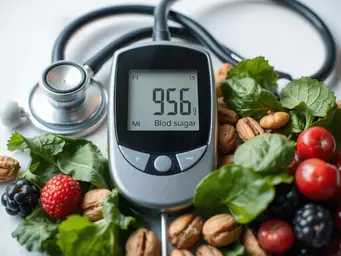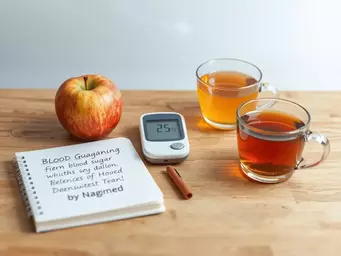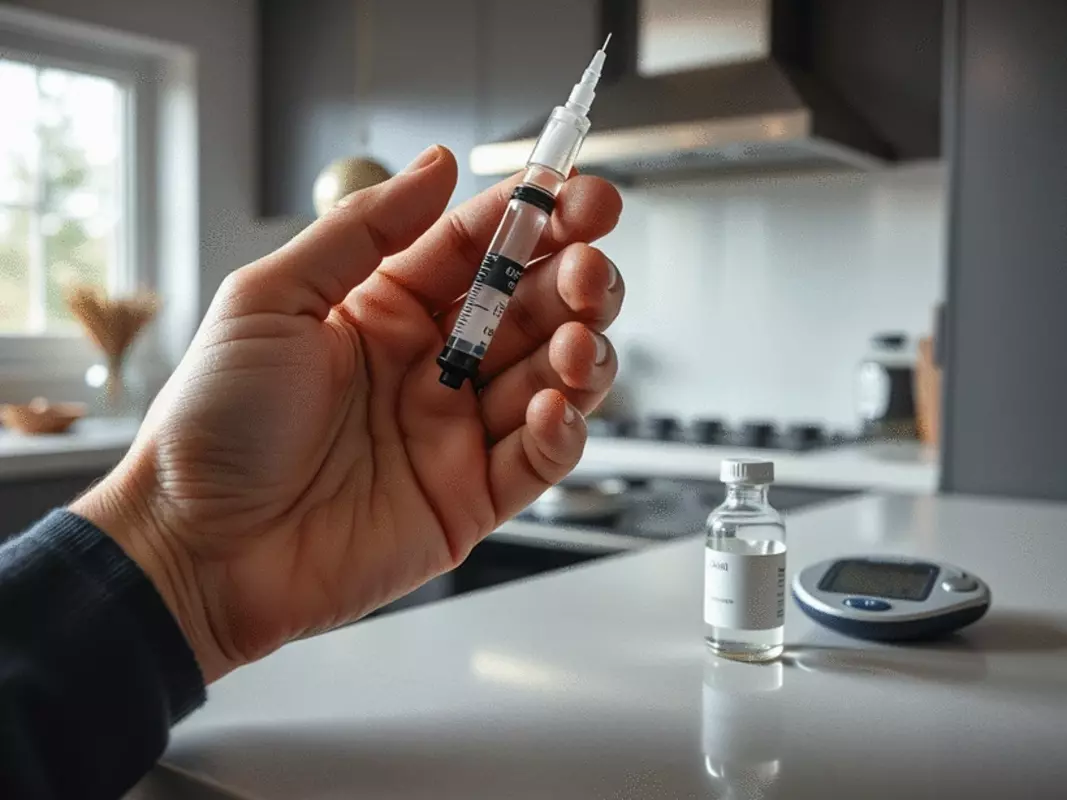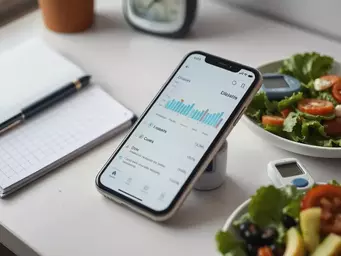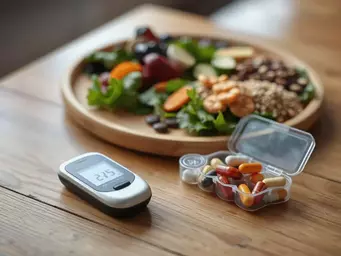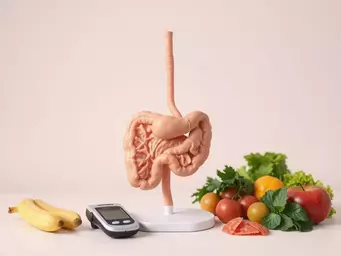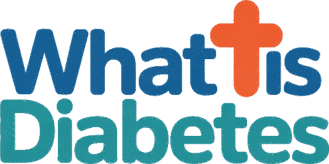Alcohol's Effects on Blood Sugar
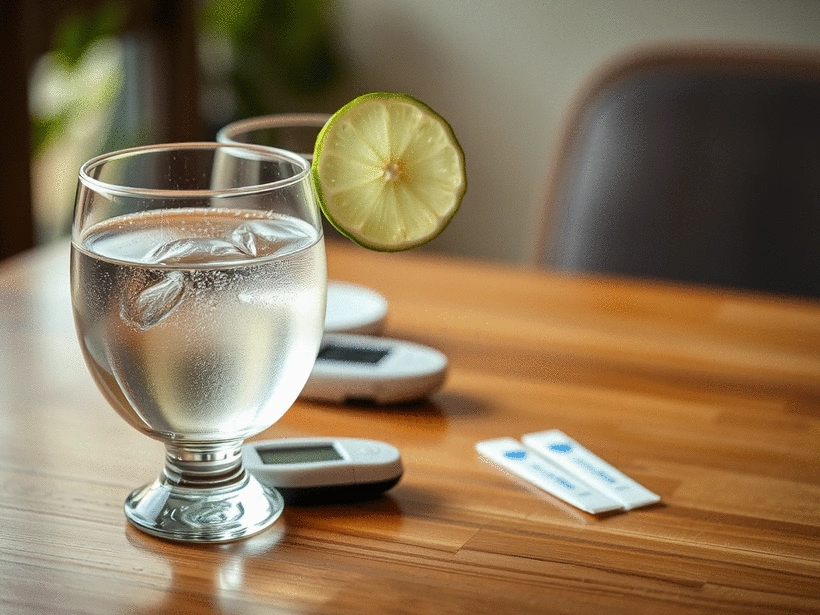
Have you ever considered the intricate dance between alcohol consumption and blood sugar levels? Understanding this connection is not just about managing diabetes; it's about empowering yourself to make informed choices for a healthier lifestyle.
What You Will Learn
- Alcohol consumption can temporarily lower blood sugar levels, especially when consumed on an empty stomach.
- Recognizing the symptoms of hypoglycemia, such as dizziness and confusion, is crucial for timely intervention.
- Moderate drinking guidelines suggest a maximum of 1 drink per day for women and 2 for men.
- Choosing low-carb alcoholic beverages, such as dry wines and spirits with sugar-free mixers, can help manage blood sugar levels.
- Tracking blood sugar levels before and after drinking can provide valuable insights into your individual response to alcohol.
Understanding Alcohol's Impact on Blood Sugar for Diabetics
This visual summarizes the key considerations for diabetics regarding alcohol consumption, focusing on risks, metabolism, and safe drinking guidelines.
Alcohol & Glucose Production
Liver prioritizes alcohol breakdown over glucose production.
- Inhibits gluconeogenesis.
- ↓ Blood sugar, especially on empty stomach.
- Masks hypoglycemia symptoms.
Hypoglycemia Risk
Significant risk for diabetics due to low blood sugar.
- Moderate drinking limits.
- Consume with food.
- Carry fast-acting sugar.
Alcohol Metabolism Impact
Takes priority, delaying glucose production.
- Effects last hours.
- Varies by alcohol type & food intake.
- Monitor levels post-drinking.
Insulin Sensitivity
Moderate vs. excessive drinking effects.
- Moderate: might improve sensitivity.
- Heavy: can lead to resistance.
- Balanced approach is key.
Safe Drinking Guidelines
Moderation and informed choices.
- Women: max 1 drink/day.
- Men: max 2 drinks/day.
- Track blood sugar before & after.
Recommended Beverages
Low-carb, low-sugar options.
- Dry wines (red/white).
- Light beers.
- Spirits with sugar-free mixers.
The Connection Between Alcohol and Blood Sugar Levels
Understanding the connection between alcohol and blood sugar levels is essential for anyone managing diabetes. Many people may not realize that alcohol can have a significant impact on how our bodies regulate glucose. When consumed, it can alter the way your body produces and processes glucose, often leading to unexpected fluctuations in blood sugar levels. Let’s explore how this works!
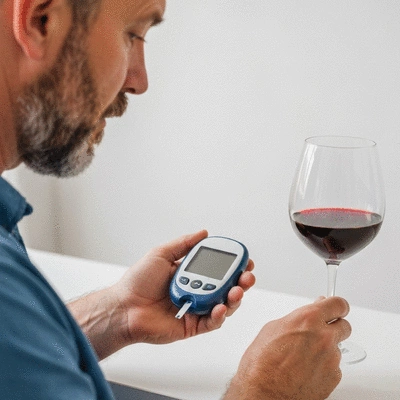
In my experience as a physician, I’ve seen firsthand how important it is for individuals with diabetes to be aware of these effects. This knowledge can help you make informed choices about your drinking habits, ensuring you stay healthy and in control.
How Alcohol Affects Glucose Production in the Body
When you consume alcohol, your liver prioritizes breaking it down over producing glucose. This can lead to a temporary decrease in your blood sugar levels. If you drink on an empty stomach, this effect can be amplified, potentially causing hypoglycemia. Here are some key points to remember:
- Alcohol inhibits gluconeogenesis, the process by which your liver produces glucose.
- This can lead to lower blood sugar levels, especially when combined with diabetes medications.
- Drinking may mask the symptoms of hypoglycemia, making it harder to recognize when your blood sugar is dropping.
Being aware of how alcohol can affect glucose production is crucial for managing your diabetes effectively. You want to ensure that any alcohol consumption is balanced with food intake and regular monitoring of your blood sugar levels.
The Risk of Hypoglycemia: What Diabetics Need to Know
One of the most significant risks of drinking alcohol for those with diabetes is hypoglycemia. This condition occurs when blood sugar levels drop too low, which can be dangerous if not addressed promptly. Understanding the risks associated with alcohol consumption can help you take proactive measures to prevent hypoglycemia. According to the National Library of Medicine, it is crucial for individuals with diabetes to be educated about the effects of alcohol to avoid complications.
- Know your limits: Stick to moderate drinking recommendations to minimize risk.
- Consume alcohol with food to help stabilize blood sugar levels.
- Always have a source of fast-acting sugar available, like glucose tablets or juice.
Recognizing and managing the risk of hypoglycemia is vital for anyone with diabetes. Monitoring your blood sugar closely can help you enjoy social occasions safely.
Understanding the Symptoms of Low Blood Sugar After Drinking
After drinking, it’s essential to be aware of the symptoms of low blood sugar. These can include dizziness, sweating, confusion, irritability, and even fainting. As someone who cares deeply about empowering individuals with diabetes, I encourage you to familiarize yourself with these signs. The American Diabetes Association provides comprehensive resources on managing alcohol intake and its impact on blood sugar.
- Shakiness or tremors
- Feeling unusually tired or weak
- Rapid heartbeat
Being proactive about recognizing these symptoms can help you respond quickly if your blood sugar drops too low, ensuring you stay safe while enjoying your beverages.
The Role of Alcohol Metabolism in Blood Sugar Management
The way your body metabolizes alcohol plays a significant role in blood sugar management. When alcohol is consumed, it takes priority over other metabolic processes, which can lead to delayed glucose production by the liver. This can result in unpredictable blood sugar levels, particularly if you do not eat while drinking.
It's crucial to understand that alcohol metabolism can differ based on various factors, including body weight, food consumption, and even the type of alcohol consumed. Here’s what to keep in mind:
- Alcohol can stay in your system longer than other foods, affecting blood sugar levels for hours.
- Different types of alcohol may have varying effects on blood sugar, depending on their sugar content.
- Regular monitoring post-drinking is essential to ensure your levels remain stable.
By understanding these dynamics, you can take steps to manage your diabetes while still enjoying a drink responsibly.
Exploring the Impact of Alcohol on Insulin Sensitivity
Lastly, let’s discuss how alcohol can potentially impact insulin sensitivity. Some studies suggest that moderate alcohol consumption might improve insulin sensitivity, while excessive drinking can lead to insulin resistance. This dichotomy is particularly relevant for individuals managing diabetes. While some research points to potential benefits of moderate consumption, it's important to note that recent findings suggest that even light to moderate alcohol consumption may not protect against diabetes or obesity, emphasizing the need for caution.
- Moderate drinking might enhance insulin sensitivity and glucose control.
- Heavy drinking can impair insulin sensitivity, leading to increased blood sugar levels.
- Maintaining a balanced approach to alcohol could support overall metabolic health.
Finding the right balance is essential for optimizing your insulin sensitivity and overall health. Remember, at What Is Diabetes, we’re here to support you in navigating your diabetes journey with informed choices. What are your thoughts on alcohol and its impact on your health?
Pro Tip
Did you know? Consuming alcohol with a meal can significantly reduce the risk of hypoglycemia? This is because food helps stabilize blood sugar levels while your body metabolizes alcohol. Always aim to pair your drinks with healthier food options for better management of your glucose levels.
Safe Drinking Guidelines for Diabetics
When it comes to enjoying a drink, it’s essential for those with diabetes to approach alcohol with care and knowledge. The good news is that with some guidelines in place, you can still partake in social gatherings and celebrate special occasions without compromising your health. Let’s explore what safe drinking looks like for diabetics!
First and foremost, moderation is key. This doesn’t just mean keeping an eye on how much you drink; it also involves making informed choices about what you drink. Understanding these nuances can help you enjoy your time while keeping your blood sugar levels stable.
Moderate Drinking: What Does It Mean for Diabetics?
Moderate drinking can look different for each individual, but generally, it means limiting alcohol intake to a maximum of:
- 1 drink per day for women
- 2 drinks per day for men
It’s important to note that these guidelines may vary based on your specific health condition. Always check with your healthcare provider to tailor recommendations to your unique situation.
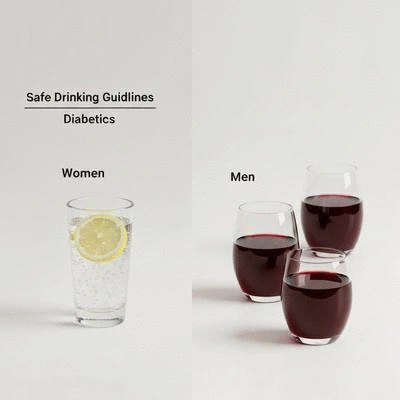
Additionally, when I talk to my patients at What Is Diabetes, I emphasize the importance of tracking your blood sugar before and after drinking. This practice can provide valuable insights into how your body responds to alcohol.
Recommended Alcoholic Beverages: Making Healthier Choices
Not all alcoholic drinks are created equal! For those managing diabetes, selecting beverages that fit within your dietary needs is crucial. Here are some options to consider:
- Dry wines (both red and white)
- Light beers
- Spirits mixed with sugar-free mixers
These choices typically have lower carbohydrate content, making them better suited for blood sugar management. As a rule of thumb, always read labels and be conscious of portion sizes.
Best Drinks for Diabetics: Low-Carb and Low-Sugar Options
Staying within the low-carb and low-sugar realm can significantly influence your experience. Here are some great options to consider:
- Unsweetened spirits such as vodka, gin, or tequila
- Dry red or white wines
- Champagne or sparkling wine (brut is best)
These drinks not only taste great but also help you maintain better control over your blood sugar levels. Remember, hydration is essential, so interspersing alcoholic beverages with water is a smart strategy!
Mixers to Avoid: Keeping Your Blood Sugar in Check
While enjoying a drink, be mindful of what you mix it with. Avoid sugary mixers that can spike your blood sugar. Here’s a quick list of mixers to steer clear of:
- Sodas (regular and diet with high sugar)
- Sweetened juices
- Flavored syrups
Instead, opt for healthier alternatives like club soda, tonic water, or flavored sparkling water. Keeping your choices simple can lead to a more enjoyable and safer drinking experience!
Understanding Glycemic Index: Choosing the Right Alcoholic Drinks
The glycemic index (GI) is a tool that helps you understand how foods affect your blood sugar. When selecting your alcoholic beverages, consider drinks with a low GI. This includes:
- Dry wines
- Light beers
- Spirits with zero-calorie mixers
Being informed about the glycemic index of the drinks you consume can empower you to make better choices and enjoy your social life without the worry!
Frequently Asked Questions About Alcohol and Blood Sugar
- Q: How does alcohol affect blood sugar levels?
- A: Alcohol primarily affects blood sugar by causing the liver to prioritize breaking down alcohol over producing glucose, which can lead to a temporary drop in blood sugar levels, especially on an empty stomach. It can also mask symptoms of hypoglycemia.
- Q: What are the main risks for diabetics when consuming alcohol?
- A: The main risk is hypoglycemia (low blood sugar), which can be dangerous if not treated promptly. Alcohol can also interfere with diabetes medications and make it harder to recognize the symptoms of low blood sugar.
- Q: What are the recommended moderate drinking guidelines for diabetics?
- A: For women, it's generally recommended to have a maximum of 1 drink per day, and for men, a maximum of 2 drinks per day. These guidelines may vary based on individual health conditions and should be discussed with a healthcare provider.
- Q: What types of alcoholic beverages are best for diabetics?
- A: Low-carb and low-sugar options are recommended, such as dry wines (red or white), light beers, and spirits mixed with sugar-free mixers like club soda or diet tonic water. Avoid sugary mixers and sweet wines.
- Q: Why is it important to eat food when drinking alcohol if you have diabetes?
- A: Consuming alcohol with food helps stabilize blood sugar levels and significantly reduces the risk of hypoglycemia. Food slows down the absorption of alcohol and provides glucose, counteracting the liver's reduced glucose production.
Recap of Key Points
Here is a quick recap of the important points discussed in the article:
- Alcohol can significantly impact blood sugar levels, causing fluctuations that require careful management.
- Drinking on an empty stomach can lead to hypoglycemia; always consume alcohol with food.
- Recognize the symptoms of low blood sugar after drinking, suchs as dizziness and confusion.
- Moderate drinking is defined as 1 drink per day for women and 2 for men.
- Choose low-carb alcoholic beverages, like dry wines and spirits with sugar-free mixers, to help manage blood sugar levels.
